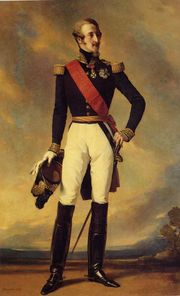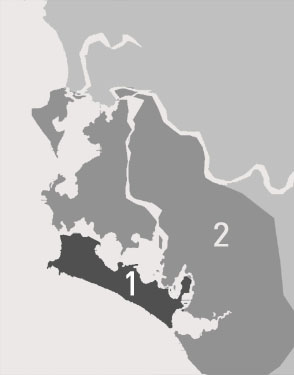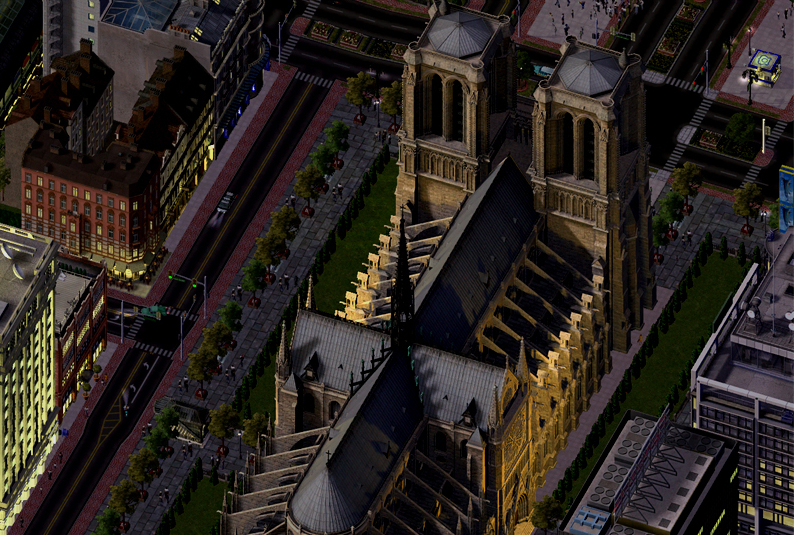Tientsin-Fort Bayart
From Ipon
m (corrections) |
|||
| Line 13: | Line 13: | ||
largest_city = [[Tientsin-Fort Bayart]] | | largest_city = [[Tientsin-Fort Bayart]] | | ||
government_type = parliament democracy | | government_type = parliament democracy | | ||
| - | leader_titles = Prefect-Governor | + | leader_titles = Prefect-Governor | |
| + | leader_names = Robert Lee | | ||
area_magnitude = nc | | area_magnitude = nc | | ||
area= nc | area_rank= nc |percent_water = nc | | area= nc | area_rank= nc |percent_water = nc | | ||
Revision as of 09:48, 19 January 2008
Tientsin-Fort Bayart, sometimes just called Tientsin or Fort Bayart, is one of the three special administrative regions of the People's Republic of China (PRC). The territory lies near the Pearl River Delta, bordering Guangdong province in the north and facing the South China Sea in the east and south. The territory begun as a trading port at the eve of the XIXth century and with the asian economic boost of the 60s, started to be a leading financial center, like Hong Kong or Singapur.
Tientsin-Fort Bayart was a French Concession from 1831 to 1946. After the WWII, it has became a overseas Territory of France until the transfer of its sovereignty in 1998. The Sino-French Joint Declaration and the Basic law of Tientsin-Fort Bayart stipulate that the territory should stay a SAR until at least 2048. Whereas Hong Kong, Tientsin is fully sovereign on it Foreign Affairs.
Contents |
History
Human settlement in the location now known as Tientsin dates back from the Paleolitic area. The proper city of Tientsin was first mentioned circa 250 BC. Tientsin was a independant state since its vasalisation by Ming Dinasty in 1745. The Tientsin Dinasty reign over a small plot a land that is aproximatly was is today Tientsin- Fort Bayart SAR.
During the Dinastic Area, how historians called the period where Tientsin Dinasty rule the region, a quire properous city has emerged on Tientsin Island. Under the reign (1570-1599) of Li Hongzhang (李鴻章), the walls of the Old Town has been built, and the Winter Castle, located at the middle of the Old Town has been largely rebuilt. The Reign of Li Hongzhand is the start of Tientsin golden period. Many Temples have been rebuilt, a summer castle has been created on Tientsin Mainland. During the XVIth century the Jesuit China Mision seen Tientsin as a start of the Christinization of Chinese land.
This period will stop in 1670 and will followed by the vasalization of Tientsin by the Ming Dinasty and the incorporation to Imperial China in 1820 during the Qing Dinasty. Tientsin Catholics didn't recognize themself into the Imeperial Chinese and became to fight and find the help of Jesuits.
In the XIXth Century, due to Tientsin religion particularity, dozens of riots of Tientsin inhabitants protesting against the Chinese incorporation hit Tientsin. With the restoration of the Company of Jesus in 1810, a French Jesuits Hipolythe de Couet was sent to a mission in China. He heard of the situation of Tientsin. Hipolythe tries to make France intervene in the conflict, but the french political instability didn't help his aim and no other european countries wanted to intervene. His dream was to create a Chinese Catholic State, under Jesuit's rule, and Tientsin was the best spot to try. Unfortunalty by asking for Louis-Philippe help, He was killing his dream. Louis-Philippe wasn't very open to let Tientsin a independant country, he had other plan in mind.
François de Nemours, the child of the Duke of Nemours and exil compagnion of Louis Phillippe D'Orléans, was apointed to be the first Duke-Governor of Tientsin, He was the First Duke of Fort Bayart. French started the planing of a new Town,now called Quartier de Fort Bayart(Fort Bayart Quarter). The constant help of Paris in Tientsin make the city propered. Many french people imigrated to Fort Bayart hoping for a better future. Fort Bayart soon became a new "Nouvel Orléans" in the earlier day. François, Duke of Fort Bayart, insisted in France, that Fort Bayart should't became the French dustbin. With the help of Jesuists, he made the mind of the French deputees changed.
By helping Louis-Napoléon Bonaparte in his coup d'état in 1852, Charles regained his title. During the IInd Empire, Fort Bayart knew a rapid developement. Major Urban Planing has been started. The Baron Haussman planed the new Fort Bayart City. The center of his masterplaning was a cathedral "à la" Notre Dame of Paris. HE apointed Jean-Eude de la Durantière, newly formed architect, to follow the construction of the new city. The Haussmanian Style became very fashionable and a lot of old chinese buildings has been destroyed to be replace by occidendal ones in Fort Bayart. It has created the today architecture landscape of Tientsin. Hopefully the country side and smaller Towns has been mainly preserved.
Geography
Politics
Regional Subdivition & Administration
Culture & Media in Tientsin
Media
See also: Media in Tientsin-Fort Bayart
Before the Transfert of Sovereignty in 1998, Tientsin's Television was mainly occupied by French Network, such as TF1, France Télévision ( with France 3 Tientsin), Canal + and M6. In the 80s some private network emerged .The biggest one today is TV4 (Tietsin Vision 4)
Newspapers, like TV Networks were mainly French ones, expect Tientsin Libre who was founded in 1945 by the group Le Monde, today Tientsin Libre is an independant media group with radio, TV and websites. Where as official TV Networking which where mainly in French. A lot of Chinese and English newpapers were published in Tientsin. The most important Chinese speaking publication is 天津新闻 (Tientsin News), created in 1956.
.....








